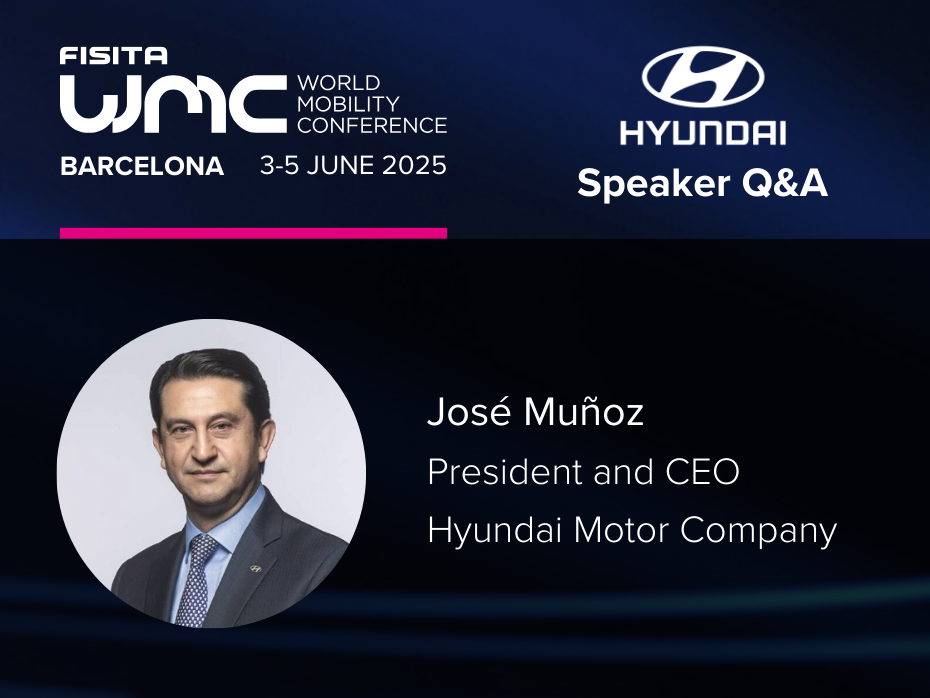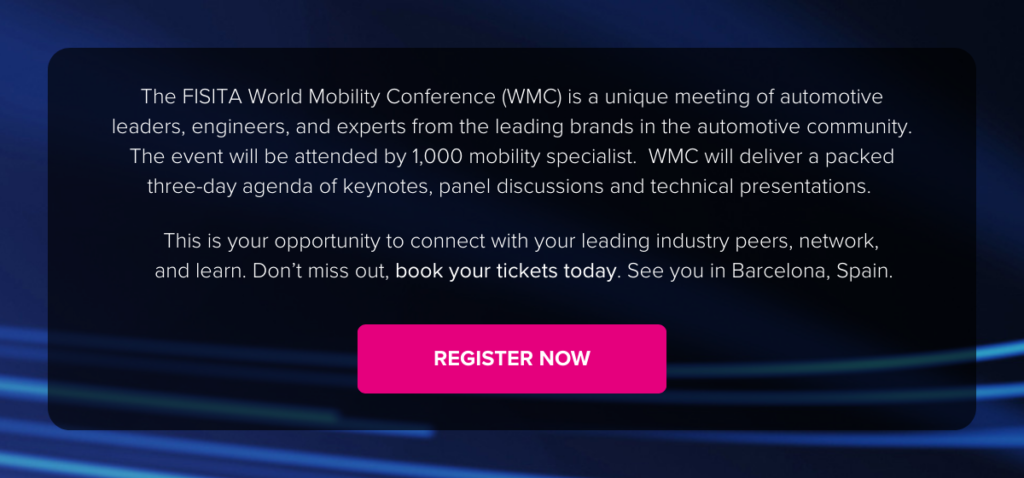Martin Kahl, FISITA’s Chief Technology Officer, talks to José Muñoz, President and CEO of Hyundai Motor Company ahead of his Principal Speech at the 2025 FISITA World Mobility Conference
“We have a compelling vision for how people and goods will move more safely, sustainably and conveniently in the future. And we have the resources to realize this vision,” says José Muñoz, President and Chief Executive of Hyundai Motor Company, who will deliver the Principal Speech at the 2025 FISITA World Mobility Conference.
In post since January 2025, Muñoz is the first non-Korean to be named global CEO of a major Korean conglomerate and leads an organisation that includes the Hyundai and Genesis brands.
The biennial FISITA World Mobility Conference brings together engineers and engineering leaders from across the technology of mobility ecosystem, and Muñoz will open the event’s plenary session on 3 June as Principal Speaker.
In this exclusive FISITA interview, Muñoz discusses the key technological challenges and opportunities in the quest for cleaner transportation, the major industry disruptions shaping the future of mobility, and the ways that automakers, suppliers and other industry stakeholders can overcome these challenges to deliver equitable and affordable products and services for the movement of people and goods.
FISITA is the global membership association of mobility engineers and engineering leaders. From your vantage point as President and CEO of a major global automaker, how do you see the transition to cleaner, more affordable, and equitable mobility playing out in different vehicle segments and in different regions of the world?
I continue to be impressed by the resilience and flexibility in how Hyundai quickly responds to changes in this dynamic industry, whether from new regulations, changing customer preferences or supply chain disruptions. Adapting to meet challenges is part of our DNA, and that includes making vehicles more sustainable and adding more value for customers.
While we continue to lead the transition to electrification, we understand that this business is based on consumer demand, which is why we continue to invest in hybrid electric vehicles, extended range electric vehicles and vehicles powered by internal combustion and even fuel cells
Hyundai Motor is delivering beautifully designed vehicles with features and technology that customers want, as evidenced by growing sales, share, brand value and industry accolades. As a result, Hyundai Motor Group, which includes KIA, is the third largest automaker in the world.
Last year our global sales volume remained stable at 4.1 million wholesale units. North America continues to be an engine of growth and had its fifth consecutive record year with sales up 9.7 percent. We see tremendous potential in India where we are now publicly traded and have high market share. Hyundai Motor remains strong in the Korean domestic market, in the Middle East and has had stable performance in the saturated and regulated European markets. We also see growth potential in South America and ASEAN and are number two in market share in Vietnam. Our go-to-market plan in Japan is robust as is our growth plan in Australia.
With excess capacity, China remains a challenge for most automakers. Hyundai Motor and our partners are adjusting capacity to be in line with demand as well as starting a new product offensive.
There are opportunities for growth everywhere and we are applying a robust midterm planning process to both accelerate and find more efficiencies in key markets. For Hyundai and Genesis, we are targeting 5.55 million vehicle sales globally by 2030, an increase of over 30 percent compared to last year.
Our fundamentals are strong. We are building high quality, safety-focused, eco-friendly vehicles and are investing significant resources to maintain product leadership. Hyundai Motor has ten significant vehicle introductions this year, including the all-new IONIQ 9 three-row EV, the new PALISADE full size SUV with both ICE and HEV powertrains, and the new STARIA Electric Van.
Hyundai Motor Group is investing in the future of mobility with robots and AI at Boston Dynamics, eVTOLs at Supernal, autonomous driving at Waymo, Motional and 42dot and in the hydrogen economy with HTWO
More powertrain choices across our lineup are emblematic of our flexible approach and how we will respond to any potential changes to U.S. policies.
While we continue to lead the transition to electrification, we understand that this business is based on consumer demand, which is why we continue to invest in hybrid electric vehicles, extended range electric vehicles and vehicles powered by internal combustion and even fuel cells.
Automotive is one of the most disruptive and disrupted industries; from a technical perspective, what do you expect will be the next big industry disruption in automotive and mobility?
We continue to develop batteries that have better performance, more range, faster charging and with less weight. And we continue to offer new iterations of hydrogen fuel cell vehicles for passenger cars and commercial vehicles. HMGMA, our new plant in Georgia, is deploying advanced robotics and automation throughout the production process to find the best combination of humans and robots to ensure quality, safety, efficiency and ergonomics.
Our autonomous driving companies, Motional and 42Dot continue to improve their capabilities, transitioning from rules-based AI to data-driven machine learning, which is very exciting, and we are looking forward to providing a fleet of IONIQ 5 EVs to Waymo for the Waymo ONE fleet.
Hyundai Motor’s core business is automotive, but the future of mobility is about the sustainable movement of people and goods, which opens up a world of opportunities, and Hyundai has been exploring new technologies such as robotics and advanced air mobility, amongst others. What does the future of mobility look like for Hyundai?
Hyundai Motor Group is investing in the future of mobility with robots and AI at Boston Dynamics, eVTOLs at Supernal, autonomous driving at Waymo, Motional and 42dot and in the hydrogen economy with HTWO. We have a compelling vision for how people and goods will move more safely, sustainably and conveniently in the future. And we have the resources to realise this vision. The Group and its more than 65 affiliates are unique in their ability to marshal resources.
This industry is as dynamic and challenging as it is rewarding. I often encourage our teams to look at challenges as opportunities to find innovative solutions in how we manage the business
In the face of macroeconomic and geopolitical uncertainty, we will continue to listen closely to our customers, partners and constituents to make sure we respond to any changes in an informed and decisive manner, leveraging the full strength of the Group.
A critical element of the future of mobility is the nurturing and development of new generations of mobility engineers. What should incumbent stakeholders do to ensure that this industry cultivates the engineers, and the engineering skills required to take this industry forward sustainably and ensure its longevity?
Hyundai is very fortunate to have an outstanding group of engineers in operations around the world. We partner with various universities to help ensure we have a robust talent pipeline, and we are always recruiting more. If there are engineers at SAE and FISITA reading this, then please get in touch with our HR team. Hyundai Motor Group has so many divisions and subsidiaries that there are many opportunities for engineers to learn new skills and to thrive. It’s very rewarding to see new generations of engineers excel and develop.
This industry is as dynamic and challenging as it is rewarding. I often encourage our teams to look at challenges as opportunities to find innovative solutions in how we manage the business. The pandemic taught us some valuable lessons about being flexible in how we manage our supply chain. We made calculated risks during Covid and they paid off. We are now flexing the same muscles in how we innovate in the face of uncertainties and impact from tariffs.
You’re the Principal Speaker at the FISITA World Mobility Conference on 3 June 2025. What will be your key message to delegates?
I’m looking forward to sharing the Hyundai story with delegates at the FISITA World Mobility Conference as well as highlighting some new technological achievements.

